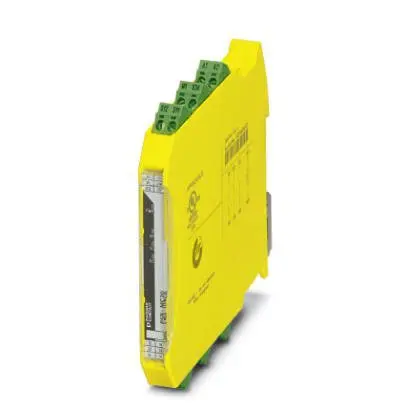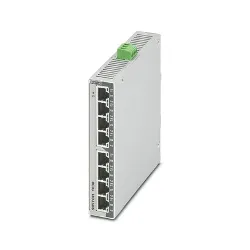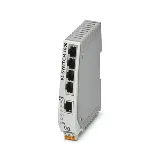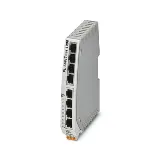| Company: | 上海当临自动化科技有限公司 |
| Location: | China - Shanghai,上海市青浦区练西公路2850号1幢 |
| Price: | Negotiation |
| Contact: | Jason(Manager) |
| Contact Me: |
Tell:+86-19921425125 Mobile:+86-19921425125 Email:0121354847484121985155413@q14q7.27co8m |
PSR-PC20-1NO-1NC-24DC-SC - Coupling relay
PSR-PC20-1NO-1NC-24DC-SC - Coupling relay
2700577
Coupling relay for SIL 3 high- and low-demand applications, couples digital output signals to the periphery, 1 enabling current path, 1 confirmation current path, 1 digital signal output, safe state off applications, test pulse filter, TBUS connection, plug-in screw terminal block
Utilization restriction
CCCex note Use in potentially explosive areas is not permitted in China.
Product type Coupling relay
Product family PSRmini
Application Safe switch off
High demand
Low demand
Ex
Relay type Electromechanical relay with force-guided contacts in accordance with IEC/EN 61810-3
Times
Typ. starting time with Us < 100 ms (with Us when controlled via A1)
Typical release time < 35 ms (when controlled via A1)
Recovery time 500 ms
Maximum power dissipation for nominal condition 3.43 W (IL² = 36 A²)
Nominal operating mode 100% operating factor
Air clearances and creepage distances between the power circuits
Rated insulation voltage 250 V AC
Rated surge voltage/insulation Safe isolation, 6 kV reinforced insulation from control circuit, start circuit, confirmation current path, signal output to the enabling current path; 4 kV/basic insulation between all current paths and housing
Supply
Designation A1/A2
Rated control circuit supply voltage US 20.4 V DC ... 26.4 V DC
Rated control circuit supply voltage US 24 V DC -15 % / +10 %
Rated control supply current IS typ. 50 mA
Power consumption at US typ. 1.2 W
Inrush current typ. 400 mA (Δt < 10 µs at Us)
Filter time max. 2 ms (at A1-A2; test pulse width)
≥ 100 ms (at A1-A2; test pulse rate)
Protective circuit Serial protection against polarity reversal; Suppressor diode 33 V
Supply
Designation 31/A2, TBUS
Diagnostic supply voltage UD 24 V DC -15 % / +10 %
Input current at UD 6 mA (at 31-A2 for UD; depending on load + 100 mA at M1 and 32)
Inrush current at UD typ. 2.5 A (Δt < 20 µs at UD)
Protective circuit Serial protection against polarity reversal; Suppressor diode 33 V
Relay: Enabling current path
Output description 2 N/O contacts in series, without delay, floating
Number of outputs 1 (safety-related N/O contacts: 13/14 (13F/14))
Contact switching type 1 enabling current path
Contact material AgSnO2
Switching voltage min. 12 V AC/DC
max. 250 V AC/DC (Observe the load curve)
Switching capacity min. 60 mW
Inrush current min. 3 mA
max. 6 A (N/O contact 13/14)
4 A (N/O contact 13F/14)
Switching capacity in accordance with IEC 60947-5-1 4 A (24 V (DC13); N/O contact 13/14)
5 A (250 V (AC15); N/O contact 13/14)
4 A (250 V (AC15); N/O contact 13F/14)
Limiting continuous current 6 A (13/14 for high-demand)
4 A (13F/14 with high/low demand, 13/14 with low demand)
Sq. Total current 36 A2 (13/14, see to derating)
16 A2 (13F/14, see to derating)
Switching frequency max. 0.5 Hz
Mechanical service life 10x 106 cycles
Output fuse 6 A gL/gG (N/O contact 13/14)
4 A gL/gG (for low-demand applications)
Relay: Confirmation current path
Output description 2 N/C contacts in series, without delay, not floating (reference ground: A2)
Number of outputs 1 (safety-related N/C contacts: 31/32)
Contact switching type 1 confirmation current path
Contact material AgCuNi, + Au
Switching voltage min. 20.4 V DC
max. 26.4 V DC
Switching capacity min. 20 mW
Inrush current min. 1 mA
max. 100 mA
Limiting continuous current 100 mA
Switching frequency max. 0.5 Hz
Mechanical service life 10x 106 cycles
Output fuse 150 mA Fast-blow
Signal: M1
Output description PNP
Number of outputs 1 (non-safety-related)
Voltage approx. 22 V DC (UD - 2 V)
Current max. 100 mA
Maximum inrush current 500 mA (Δt = 1 ms at Us)
Short-circuit protection no
Output fuse 150 mA fast blow

Disclaimer:All information is provided by registered users. You may assess risks based on corresponding qualifications.
 FL SWITCH 1000-8POE-GT - Industrial Ethernet Switch
FL SWITCH 1000-8POE-GT - Industrial Ethernet Switch
 FL SWITCH 1001-4POE-GT - Industrial Ethernet Switch
FL SWITCH 1001-4POE-GT - Industrial Ethernet Switch
 FL SWITCH 1004N-FX SM - Industrial Ethernet Switch
FL SWITCH 1004N-FX SM - Industrial Ethernet Switch
 FL SWITCH 1004N-SFX - Industrial Ethernet Switch
FL SWITCH 1004N-SFX - Industrial Ethernet Switch
 FL SWITCH 1104N-SFP - Industrial Ethernet Switch
FL SWITCH 1104N-SFP - Industrial Ethernet Switch
 FL SWITCH 1105N-2SFP - Industrial Ethernet Switch
FL SWITCH 1105N-2SFP - Industrial Ethernet Switch
![fastest single needle bag closing machine for sewing bags]() fastest single needle bag closing machine for sewing bagsThe bag closing machine head is equipped with continuous ( roll ) feeder and sewing needle for the feeding system ." "
fastest single needle bag closing machine for sewing bagsThe bag closing machine head is equipped with continuous ( roll ) feeder and sewing needle for the feeding system ." "![Standard needle thread double locked bag closing machine]() Standard needle thread double locked bag closing machineSew20 Plain Sew Heavy Duty Bag Closing System machinery Sewing Paper , Poly Woven & Laminated Open Mouth Bags with a Plain Stitch at Up to 20 Bags Per" "
Standard needle thread double locked bag closing machineSew20 Plain Sew Heavy Duty Bag Closing System machinery Sewing Paper , Poly Woven & Laminated Open Mouth Bags with a Plain Stitch at Up to 20 Bags Per" "![versatile small volume bagging Sewing machine System]() versatile small volume bagging Sewing machine SystemSewing Paper , Poly Woven & Laminated Open Mouth Bags with a Plain Stitch at Up to 10 Bags Per Minute ." "
versatile small volume bagging Sewing machine SystemSewing Paper , Poly Woven & Laminated Open Mouth Bags with a Plain Stitch at Up to 10 Bags Per Minute ." "![Plain Sew Heavy Duty Bag Closing System machinery]() Plain Sew Heavy Duty Bag Closing System machinerylightweight handheld electric bag closer sewing machine The bag stitcher machine is designed with a plastic handle ." "
Plain Sew Heavy Duty Bag Closing System machinerylightweight handheld electric bag closer sewing machine The bag stitcher machine is designed with a plastic handle ." "




